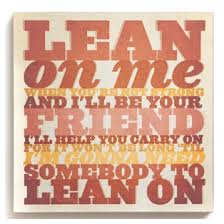 Resurrecting “Lean On Me”; A Personal Response
Resurrecting “Lean On Me”; A Personal Response
A 2011 Baylor University study revealed that help from the church with depression and mental illness was the second priority of families with mental illness, while it ranked 42nd on the list of requests from families that did not have a member with mental illness.
If we offer “care” for someone, what does that mean? Clinically we say, “We offer services,” as a friend, “I’m there for you,” and as a church attender, “We will pray for you.” One offers programs, one personalization, and the last a detached response. Institutional churches can offer programs they label as ministries like a drug and alcohol ministry or mental health ministry. “We’ll pray for you,” offers concern but no personal involvement or social interaction with the person, and often turns into gossip circles. The personal, “I am there for you,” option is the most effective, the most Christ-like option, but requires sacrifice and commitment of actually being “available” 24/7 on our parts!
 The personal option does not need building or program structures; it just needs you! Your involvement, your time, your commitment, your concern, you “just being there.” Often most forms of effective ministry never need a designated building or specifically designed program, it just need the human element of love, care, commitment, and involvement, just “being there” for someone.
The personal option does not need building or program structures; it just needs you! Your involvement, your time, your commitment, your concern, you “just being there.” Often most forms of effective ministry never need a designated building or specifically designed program, it just need the human element of love, care, commitment, and involvement, just “being there” for someone.
Mental illness strives for isolation and detachment. Just “being there” prevents both of these from occurring by reinforcing the recovery process. One fighting depression often feels “overwhelmed,” unable to tackle situations alone, but “being there” eases that pain. Schizophrenia distorts one’s rationale, but having one by your side whom you trust counters that. Currently clinical help only comes during the crisis stage, but having someone sensitive to your mood, stability, and needs by you can detect when something isn’t right early. That is called prevention.
 Since the “Church” is not an individual, but a collective group, the “being there” can be shared, distributed among others, not to be a burden. Intimate small group ministry that meets regularly can offer more than a clinical Group Therapy that discourages close interpersonal relationships by its members. Church small groups shouldn’t turn into programs like Bible studies, or just talk sessions, but become a process for building relationships that produce life beyond group meetings. That’s family!
Since the “Church” is not an individual, but a collective group, the “being there” can be shared, distributed among others, not to be a burden. Intimate small group ministry that meets regularly can offer more than a clinical Group Therapy that discourages close interpersonal relationships by its members. Church small groups shouldn’t turn into programs like Bible studies, or just talk sessions, but become a process for building relationships that produce life beyond group meetings. That’s family!
Religious cults and inner city gangs draw people into their midst because they act as an accepting family. Family offers a support system to someone stripped of many of their abilities, talents, and social graces due to mental illness. Without a family homelessness and a skirmish with the lay can be a real possibility.
 Bill Wither’s Lean On Me song, now decades old, advocates what one must do to be effective. “Sometime in our lives we all have pain, we all have sorrow, but if we are wise, we know that there’s always tomorrow. Lean on me, when you’re not strong, and I’ll be your friend. I’ll help you carry one, for it won’t be long till I’m gonna need somebody to lean on. Please swallow your pride if I have things you need to borrow, for no one can fill those of your needs that you won’t let show. You just call on me brother, when you need a hand. We all need somebody to lean on. I just might have a problem that you’d understand. We all need somebody to lean on. If there is a load you have to bear that I can’t carry. I’m right up the road; I’ll share your load if you just call me.
Bill Wither’s Lean On Me song, now decades old, advocates what one must do to be effective. “Sometime in our lives we all have pain, we all have sorrow, but if we are wise, we know that there’s always tomorrow. Lean on me, when you’re not strong, and I’ll be your friend. I’ll help you carry one, for it won’t be long till I’m gonna need somebody to lean on. Please swallow your pride if I have things you need to borrow, for no one can fill those of your needs that you won’t let show. You just call on me brother, when you need a hand. We all need somebody to lean on. I just might have a problem that you’d understand. We all need somebody to lean on. If there is a load you have to bear that I can’t carry. I’m right up the road; I’ll share your load if you just call me.